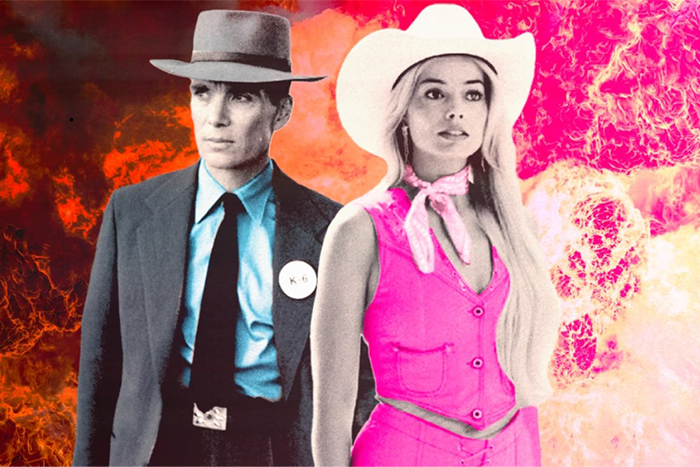
Much has been made of this summer’s blockbuster movie phenomena, Greta Gerwig’s “Barbie” and Christopher Nolan’s “Oppenheimer,” which were released on the same weekend. The films have become a strange double feature, both bound to the same cultural moment. While they seem to have little in common, both films depict maverick Jewish thinkers whose ideals created seismic shifts in the world.
In “Oppenheimer,” this connection is straightforward. Oppenheimer (played by Cillian Murphy), was Jewish, as were most of the scientists who helped create the atomic bomb. As for “Barbie,” the real-life creator of the doll, Ruth Handler (portrayed by Rhea Perlman), was Jewish and a founding member of Reform congregation Temple Isaiah in Los Angeles. Handler created the Barbie doll to give little girls a chance to dream of a career in addition to, or even in place of, motherhood. Both inventors had plans for their creations. They believed they were making the world a better place, even a safer place. Yet, over the decades, their inventions have evolved in ways they never intended.
Nolan and Gerwig have set out to unpack the contradictions inherent in their films’ subjects. Did Oppenheimer make the world a better place? Did he create the weapon to end all wars, or did he place humankind in jeopardy? Did Handler liberate little girls to dream of the careers they could someday grow up to have, or did Barbie chain them to unrealistic beauty standards?
Nolan’s Oppenheimer doesn’t appear to have a religious bone in his body. He’s a master linguist, fluent in six languages, but when he meets fellow Jewish physicist Isidor Rabi (David Krumholtz), he can’t understand Yiddish. Rabi chastises Oppenheimer good-naturedly and encourages him to eat. Despite this, Oppenheimer does carry with him certain Jewish ideals. He believes in the dignity of the common person and the rights of workers. When it becomes apparent that the Germans are developing an atomic weapon, he feels a responsibility to both the Jewish people and the world to beat the Germans to it.
The Babylonian Talmud says, “All of Israel is responsible, one for the other” (Shevuot 39a). Many of the scientists who worked on the Manhattan Project were Jewish and studied in Europe. Oppenheimer himself was taught in Germany under the Danish physicist Niels Bohr (played in the film by Kenneth Branagh). Oppenheimer and his cohort were acutely aware of the plight of European Jewry under the Nazis. The idea that Hitler could possess a weapon of mass destruction was terrifying. As Oppenheimer says in the film, “I don’t know if we can be trusted with such a weapon. But I know the Nazis can’t. We have no choice.” His fellow Jewish scientists agreed. They felt a responsibility to save the Jewish people and all humanity. Once the Germans surrendered, however, the scientists began to oppose the use of the atomic weapon. As the movie continues, Oppenheimer tries to put the genie back in the bottle to no avail. Though he is lauded at first, backlash inevitably follows, along with his own guilt.
In “Barbie,” Margot Robbie plays “stereotypical” Barbie -- the original version of the doll. After experiencing an existential crisis, she embarks from Barbie Land to the real world, where she learns that everything she’s been told about existence is false. Under the impression that Barbie dolls have created a real-world society of liberated women, Barbie is crushed when she learns men still dominate everything. Ken (played by Ryan Gosling) tags along and finds that the patriarchy is more his jam, returning to Barbie Land an “enlightened” man.
“Barbie” must somehow balance Mattel’s brand appeal with a discerning take-down of the brand’s drawbacks. While honoring nostalgia for the doll, the movie must also fight the patriarchy, investigate the plight of the modern woman, and be funny. And yet, somehow, it succeeds at all those things. Many of the women I’ve spoken to feel seen by the movie. While the men I’ve heard from by seem to enjoy the movie, there have been several outspoken male critics. I’ve seen/read/heard everything: the film is anti-family, seeks to divide men and women, and/or is advocating for the subjugation of men.
I don’t believe any of that. This is an egalitarian film through and through. If anything, Gerwig is just pointing out the obvious; the enduring gender inequality in our society. “Barbie” is just holding up a mirror. When the Kens are cast aside in the matriarchal realm of Barbie Land, it’s less a commentary on the state of manhood then a riposte to show men how it feels to be second fiddle. Unfortunately, “Oppenheimer” is a case in point. The only important female roles in the film are Oppenheimer’s wife, Kitty (played by Emily Blunt), his mistress, Jean Tatlock (Florence Pugh), along with Lilli Hornig (Olivia Thirlby), one of the few female scientists to work on the Manhattan Project. These are mostly thankless roles. If women have been relegated to the supportive sidekick role for so long, is it really so bad for once that the Kens must go to the beach while the Barbies run the Supreme Court and win Pulitzers?
Gerwig seems to be pushing for greater equality by pushing buttons. But as Oppenheimer’s life shows us, unintended consequences abound. In the case of “Barbie,” it is ironic that the most interesting and iconic performance in the movie is arguably Ryan Gosling’s portrayal of Ken. Gosling plays the buffoon to perfection and, just as Ken takes over Barbie Land, Gosling quite literally takes over this movie.
These two films can be understood on many levels: real-life subjects seen through the genres of Hollywood biopic and satire, examples of Jewish ideals in action, or even cautionary tales of creators losing control of their creations.
If this is the direction that blockbuster cinema is taking, count me in.
Related Posts

Where Have All the Jewish Movies Gone?

Superman Can Inspire Us to be Jewish Heroes


